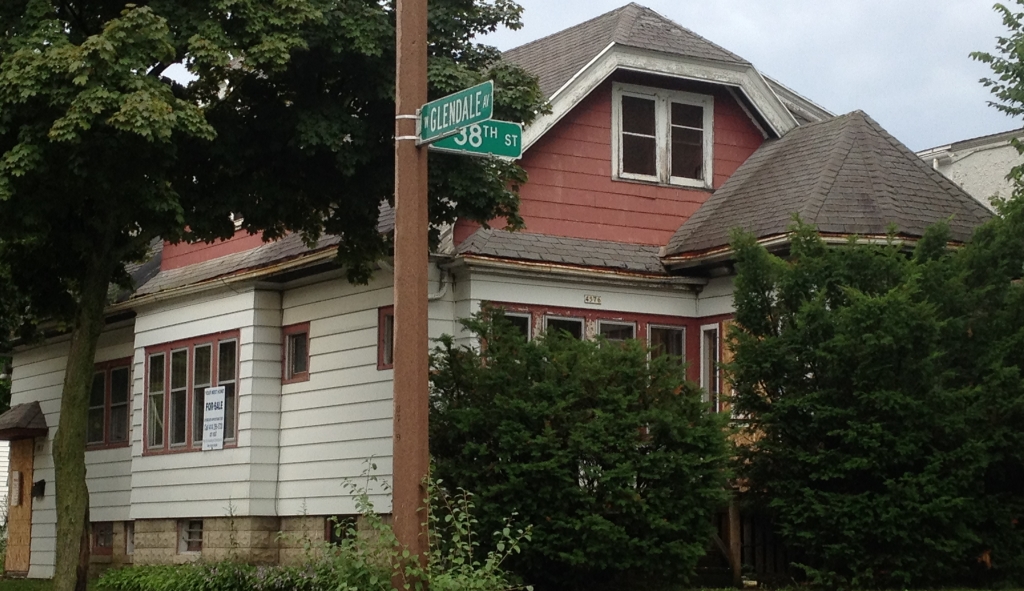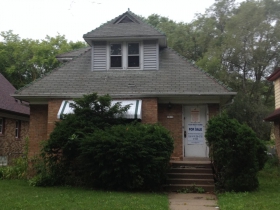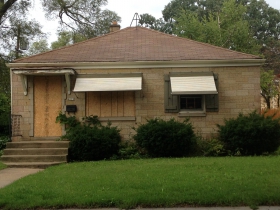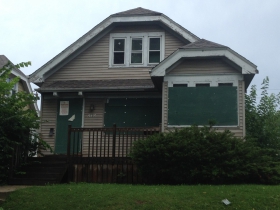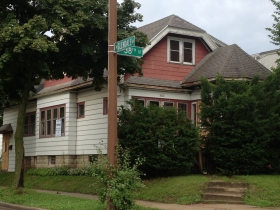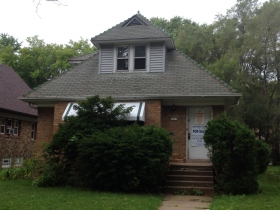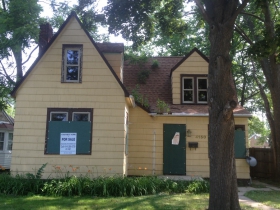The Problem of Foreclosed Homes
Housing must be improved if a rehabbed 30th Street Corridor is to succeed. Part 4 of a series.
Yvonne McCaskill remembers what it was like to live in Milwaukee, back in 1951, when she was five and her family moved to the city: “Black people could not live north of North Avenue, east of 3rd Street (Now Martin Luther King Dr.), south of Walnut or west of 20th, and I think that’s stretching it.” An activist and organizer by temperament, she marched across the 16th Street Viaduct with Father James Groppi and when she was newly married, she and her husband tried to buy a duplex north of Capitol Drive. They were redlined and they sued and won their case, but they ended up deciding not to live there anyway, she says with a laugh, pointing towards her house in the Triangle neighborhood just south of Capital, “we ended up over there.”
A.O. Smith was in full production back then and the neighborhood, she says, was very diverse–working families, lots of kids, multi-generational, owner-occupied housing. The decay, she says, happened slowly. Part of the appeal of the neighborhood, she remembers, was the school that sat at the southern end of her street, where it joined Hopkins Ave., but suddenly, and with no warning, the houses on the western side of the block started getting torn down because A.O. Smith wanted to put a parking lot there. That was the first time in her 40-year tenure in the neighborhood that residents organized. The company and the city came to the table and residents got a park, and street barriers on the Hopkins border so that the corridor’s trucks could no longer rumble through her neighborhood. But eventually, they lost the school. The park is still there–a tot lot now–and just last year, residents put in a healing garden, a Little Free Library and one of Marina Lee‘s bright and playful sculptures.
These are early signs of what she believes will be a successful revival in her neighborhood. “It has to be,” she says. And unlike 40 years ago, the neighborhood has been treated as one of the principle stakeholders in the development of the 30th Street Corridor project.
According to Martha Brown, Deputy Commissioner of the Department of City Development (DCD), there are just over 7,200 residential properties in the corridor. Of those, 323, or 4.5 percent, are currently city tax foreclosures. Another 88 are bank owned properties–though that number changes frequently because bank foreclosures are more fluid than city ones. Of the city’s entire portfolio of 1,248 foreclosed properties, both residential and commercial, says Brown, 358 — or nearly 29 percent — are within the corridor.
Resolution of city foreclosures, explains Brown, is a long process involving a collection period and if needed, a final judgment in Circuit Court. DCD is on track to sell 350 properties this year–a record, Brown says. Three to four hundred demolitions are planned city-wide. They’ve taken over 300 new properties this year and expect another 300 for next year. While the rate of foreclosures is declining in the city, the three-year cycle of resolution means the disposition of those properties lags behind the rate at which they are foreclosed.
The city has a number of incentive programs including lease-to-own agreements and forgivable loan for repairs that can help the tenants of foreclosed homes become the owners of them. But the city doesn’t have a way of focusing on specific neighborhoods. For that, officials rely on non-profits like the Northwest Side Community Development Corporation. NWSCDC is able to function like a specialty bank focused on community development. Their housing program is called NW Impact, and according to its Director, Willie Smith, they have already closed on seven properties, and are prepared to purchase between 70 and 90 city-owned homes within a one-mile radius of the NWSCDC’s office in the Century City Towers on 27th Street just north of Capital — predominantly in the Garden Homes, Triangle and Little Canada neighborhoods.
According to Smith, who comes to this work following a career in for-profit real estate and mortgage lending, NW Impact’s plan is to buy up to ten houses at a time, in clusters so that a block that they’re working on isn’t undermined by a lingering foreclosure nearby. After purchase, they hire minority contractors from the neighborhood to rehab it for sale. They purchase and rehab these houses with money from a $3.2 million dollar loan that was a “fifty-fifty split between PNC Bank and WHEDA.” It’s a loan, he says “that we have to pay back.”
Their position as a community development organization gives them the flexibility not only to work in clusters, but to develop lease-to-own programs for tenants who are either already in the buildings or living nearby and they only work on owner-occupied sales. NW Impact partners with Greenpath, an organization that helps individuals manage debt and develop their credit record, and ACTS Housing, a Milwaukee faith-based group that helps homebuyers. “We’re not in this alone,” says Smith.
For the lease-to-own program, they look for tenants with a good rental history who will be able to establish credit-worthiness within a year. NW Impact does not make the final loan; that comes from the bank. “It’s a market-based program,” says Smith. The financials for the homeowner work because rents in the area run between $700 to $1,000 dollars a month. The mortgage, escrow and insurance on a $50,000 house, given current low interest rates and low property tax assessments, will be closer to $500. The market also protects the program from being exploited by speculators who want to use the organization’s resources to get an inexpensive house that they can flip. “Honestly,” says Smith, “the numbers aren’t there to flip houses. You can’t have that market for flipping homes when you have this many foreclosures.”
The program goal, like that of the business developers and the workforce initiatives, is long-term sustainability. “I don’t want this to be a special program that doesn’t require sufficient underwriting,” he says. NW Impact’s jobs is to make the houses habitable, find buyers, and then help them develop the credit worthiness and basic skills that make them responsible homeowners. “It’s market based,” he says. “We’d like that to continue.”
Further south of the middle class neighborhoods of the corridor, the challenge is bigger. “They’re not as organized,” says Smith. Gary Wenzel of Capitol Stampings, a company in the area, knows of three boarded-up houses on Meinecke Ave. that abut his factory. The housing issue, he says, “is one of the biggest concerns.” Another problem is the empty store fronts on North Avenue, he notes. Wenzel is worried that the problems created by the foreclosures, like crime, will metastasize. “They will continue to erode,” he says of the troubled streets. “That is a challenge. That is a very serious problem.” In all of his dealings with the corridor’s development, he’s never seen a comprehensive plan to deal with the associated crime.
Still, Yvonne McCaskill is confident. “You don’t want a shabby neighborhood up against a billion dollar development,” she says. She credits Michael Weiss of the General Capital company for coming into the neighborhood in the early stages of his project and seeking input. When people with the money, like Weiss, choose to come into the neighborhood, and choose to invest in it, she says, they’re demonstrating they’re not afraid of the neighborhood, or the people who live there. She says the city is also collaborating with the neighborhood. From RACM to the Milwaukee Police’s 5th District to the local fire station, everyone has looked for input and stepped forward with resources.
Her hope is that the housing program will eventually solicit buyers from all over the city, giving her neighborhood the kind of diversity–racial, economic, generational–that she remembers from her early days as a new mother and new homeowner when the neighborhood was healthy and vital. She doesn’t care how or why people got to the table, it matters only that they get there. “Even if it happened by accident, it doesn’t matter,” she says. “If everyone does their part, then this can work.”
Homes Owned by NWSCDC
Corridor of Dreams
-
How to Design a Public Space
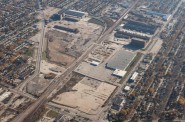 Jun 26th, 2015 by Susan Nusser
Jun 26th, 2015 by Susan Nusser
-
Celebrating the First Homeowner in New Program
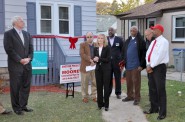 Oct 24th, 2014 by Susan Nusser
Oct 24th, 2014 by Susan Nusser
-
Putting the Pieces Together
 Oct 17th, 2014 by Susan Nusser
Oct 17th, 2014 by Susan Nusser

